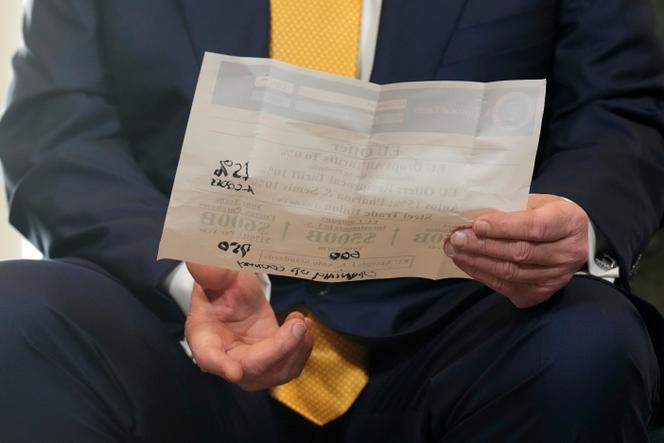What does the agreement between Ursula von der Leyen and Donald Trump on customs duties provide?
Cars, wine, luxury goods... Key sectors of the European economy will be affected by 15% US customs duties, according to the agreement announced on Sunday, July 28, by US President Donald Trump and European Commission President Ursula von der Leyen.
The Turnberry Agreement confirms that transatlantic trade has entered a new era, one of unashamed American protectionism. Until Donald Trump's return to power, it was marked by an average US tariff of 4.8%.
The framework agreement between the European Union and the United States, however, remains unclear. Here is what we know so far:
Until now exempt from customs duties, they will not receive special treatment, Donald Trump warned on Sunday, without providing further details. According to Ms. von der Leyen, pharmaceutical products are covered by the 15% US customs duties, even though Mr. Trump had made it clear during the first discussions between the two leaders that he did not want to include them in the agreement.
Pharmaceutical products are currently the most exported products from Europe to the United States, worth nearly 120 billion euros in 2024 (22.5% of total exported goods), according to Eurostat.
European automobile taxation is falling to 15%, down from 2.5% before the Trump administration and down from 27.5% since April. Nearly €70 billion worth of transport equipment was exported by European companies to the United States in 2024. The automotive industry sold nearly 750,000 cars there for €38.5 billion, according to the European Automobile Manufacturers Association (ACEA).
Germany produces the majority of these vehicles, including premium sedans, SUVs, and sports cars from Audi, Porsche, BMW, and Mercedes. Sunday's agreement is an improvement for the sector. Following the 25% surcharge, Volkswagen's deliveries had declined in the first half of the year.
The agreement announced on Sunday provides for zero taxes on aircraft equipment, according to Ursula von der Leyen.
US tariffs weighed heavily on this highly globalized sector. Since March, a 50% surcharge has been applied to imports of aluminum and steel, key materials in the aeronautics industry. And all equipment (including aircraft) imported from Europe had to pay a 10% surcharge.
Luxury goods should not be subject to an exceptional regime, so the 15% should apply.
In recent weeks, Bernard Arnault, head of French giant LVMH, has been working to limit surcharges, both with European leaders and Donald Trump. For LVMH, a 15% tariff "would be a good result," its chief financial officer said on Thursday. The group believes it can compensate by raising prices and optimizing production, particularly in the United States. The world's leading luxury goods company has announced the opening of a fourth Louis Vuitton workshop in Texas.
In May, his competitor François-Henri Pinault, from the Kering group which owns Gucci and Balenciaga, declared that "it would not make sense to have Italian Gucci bags made in Texas."
French and Italian cosmetics brands are also widely sold in the United States: in 2024, L'Oréal generated 38% of its revenue there. In April, its CEO mentioned the possibility of relocating part of its production there.
"Certain agricultural products" will be exempt from the 15% tax, said Ursula von der Leyen. But no details were provided Sunday evening. Some food products such as cheese and canned goods are a major European export.
No decisions have been made regarding wines and spirits under the agreement, and details will be worked out in the coming weeks.
In 2024, the EU exported €8 billion worth of alcohol, including more than €5 billion worth of wine, to the United States, its largest export market.
France accounts for about half: €2.4 billion worth of wine and €1.5 billion worth of spirits were sold in the United States (about 25% of its exports). For Italy, it's about €2 billion worth of wine exported. Sweden sells its vodka to the United States, Ireland its whisky...
Bordeaux wines, for example, generate 20% of their turnover there. "At 10% or 15% [customs duties, editor's note] , we will find solutions," explained Philippe Tapie, president of Bordeaux Négoce, before Sunday's announcement. But "at 30%, no. That's the end of the story," he feared.
 " srcset="https://img.lemde.fr/2025/07/28/0/0/5616/3744/320/0/75/0/23067cf_upload-1-f8kycc2d8yk1-527742.jpg 320w, https://img.lemde.fr/2025/07/28/0/0/5616/3744/556/0/75/0/23067cf_upload-1-f8kycc2d8yk1-527742.jpg 556w, https://img.lemde.fr/2025/07/28/0/0/5616/3744/640/0/75/0/23067cf_upload-1-f8kycc2d8yk1-527742.jpg 640w, https://img.lemde.fr/2025/07/28/0/0/5616/3744/664/0/75/0/23067cf_upload-1-f8kycc2d8yk1-527742.jpg 664w, https://img.lemde.fr/2025/07/28/0/0/5616/3744/960/0/75/0/23067cf_upload-1-f8kycc2d8yk1-527742.jpg 960w, https://img.lemde.fr/2025/07/28/0/0/5616/3744/1112/0/75/0/23067cf_upload-1-f8kycc2d8yk1-527742.jpg 1112w, https://img.lemde.fr/2025/07/28/0/0/5616/3744/1328/0/75/0/23067cf_upload-1-f8kycc2d8yk1-527742.jpg 1328w, https://img.lemde.fr/2025/07/28/0/0/5616/3744/1668/0/75/0/23067cf_upload-1-f8kycc2d8yk1-527742.jpg 1668w, https://img.lemde.fr/2025/07/28/0/0/5616/3744/1992/0/75/0/23067cf_upload-1-f8kycc2d8yk1-527742.jpg 1992w, https://img.lemde.fr/2025/07/28/0/0/5616/3744/2301/0/75/0/23067cf_upload-1-f8kycc2d8yk1-527742.jpg 2301w" sizes="(min-width: 1024px) 556px, (min-width: 768px) 664px, 100vw" width="664">
" srcset="https://img.lemde.fr/2025/07/28/0/0/5616/3744/320/0/75/0/23067cf_upload-1-f8kycc2d8yk1-527742.jpg 320w, https://img.lemde.fr/2025/07/28/0/0/5616/3744/556/0/75/0/23067cf_upload-1-f8kycc2d8yk1-527742.jpg 556w, https://img.lemde.fr/2025/07/28/0/0/5616/3744/640/0/75/0/23067cf_upload-1-f8kycc2d8yk1-527742.jpg 640w, https://img.lemde.fr/2025/07/28/0/0/5616/3744/664/0/75/0/23067cf_upload-1-f8kycc2d8yk1-527742.jpg 664w, https://img.lemde.fr/2025/07/28/0/0/5616/3744/960/0/75/0/23067cf_upload-1-f8kycc2d8yk1-527742.jpg 960w, https://img.lemde.fr/2025/07/28/0/0/5616/3744/1112/0/75/0/23067cf_upload-1-f8kycc2d8yk1-527742.jpg 1112w, https://img.lemde.fr/2025/07/28/0/0/5616/3744/1328/0/75/0/23067cf_upload-1-f8kycc2d8yk1-527742.jpg 1328w, https://img.lemde.fr/2025/07/28/0/0/5616/3744/1668/0/75/0/23067cf_upload-1-f8kycc2d8yk1-527742.jpg 1668w, https://img.lemde.fr/2025/07/28/0/0/5616/3744/1992/0/75/0/23067cf_upload-1-f8kycc2d8yk1-527742.jpg 1992w, https://img.lemde.fr/2025/07/28/0/0/5616/3744/2301/0/75/0/23067cf_upload-1-f8kycc2d8yk1-527742.jpg 2301w" sizes="(min-width: 1024px) 556px, (min-width: 768px) 664px, 100vw" width="664">American steel and aluminum, previously protected by 50% tariffs on competing products entering the country, even from Canada and Mexico, could be the subject of separate negotiations. The agreement reached Sunday did not resolve this issue.
The European Union also committed under the agreement to strategic purchases worth $750 billion (around €640 billion), covering oil, liquefied natural gas (LNG), nuclear power, fuels and chips, during Donald Trump's term.
However, the European Commission has no real powers in these areas. It cannot place orders on the oil and gas markets. If these promises result in increased purchases of American liquefied natural gas, they could also jeopardize Europe's climate ambitions. The Commission also cannot make investments on behalf of companies.
The EU has also pledged to invest $600 billion in the United States over this period and to purchase American military equipment worth " hundreds of billions of dollars ," according to Donald Trump.
On Thursday, July 24, the European Union gave the green light to a series of trade retaliation measures targeting the United States. This response, estimated at €93 billion, was to be implemented starting August 7 if no agreement was reached with Washington on the issue of customs duties. For the time being, these countermeasures will therefore not be implemented.
Contribute
Reuse this content




